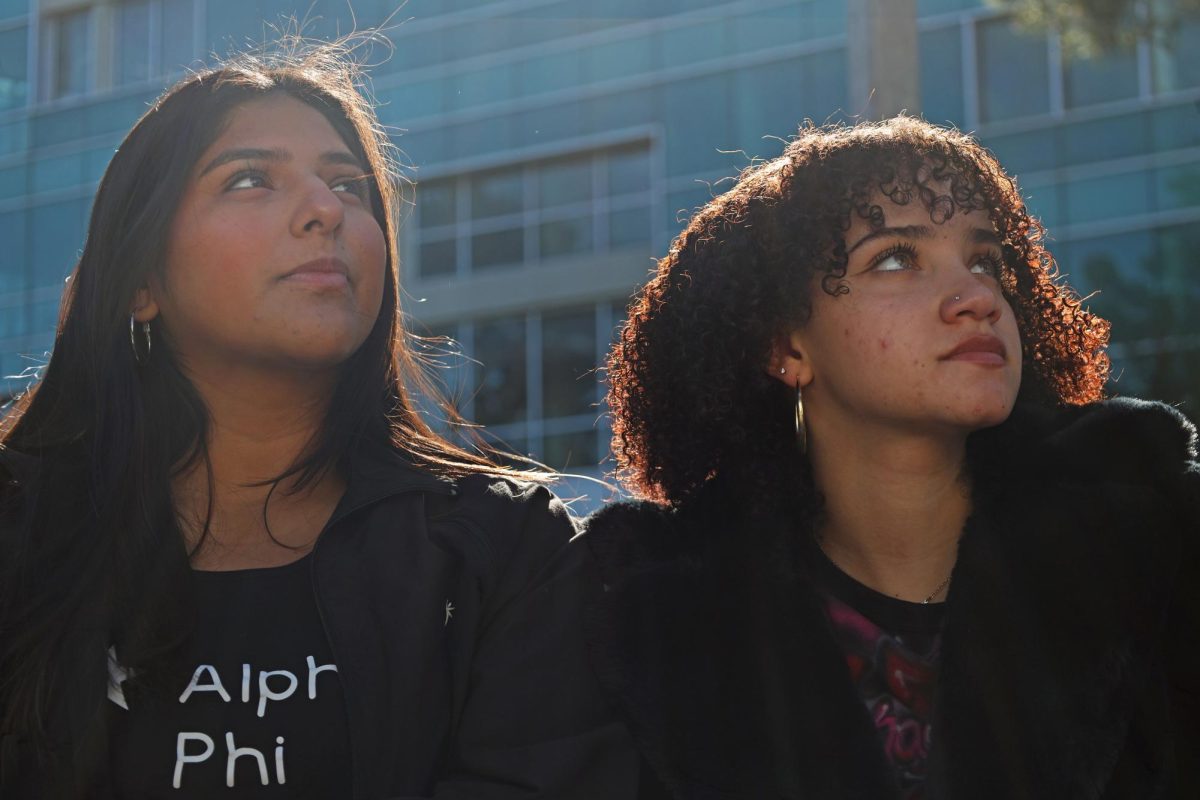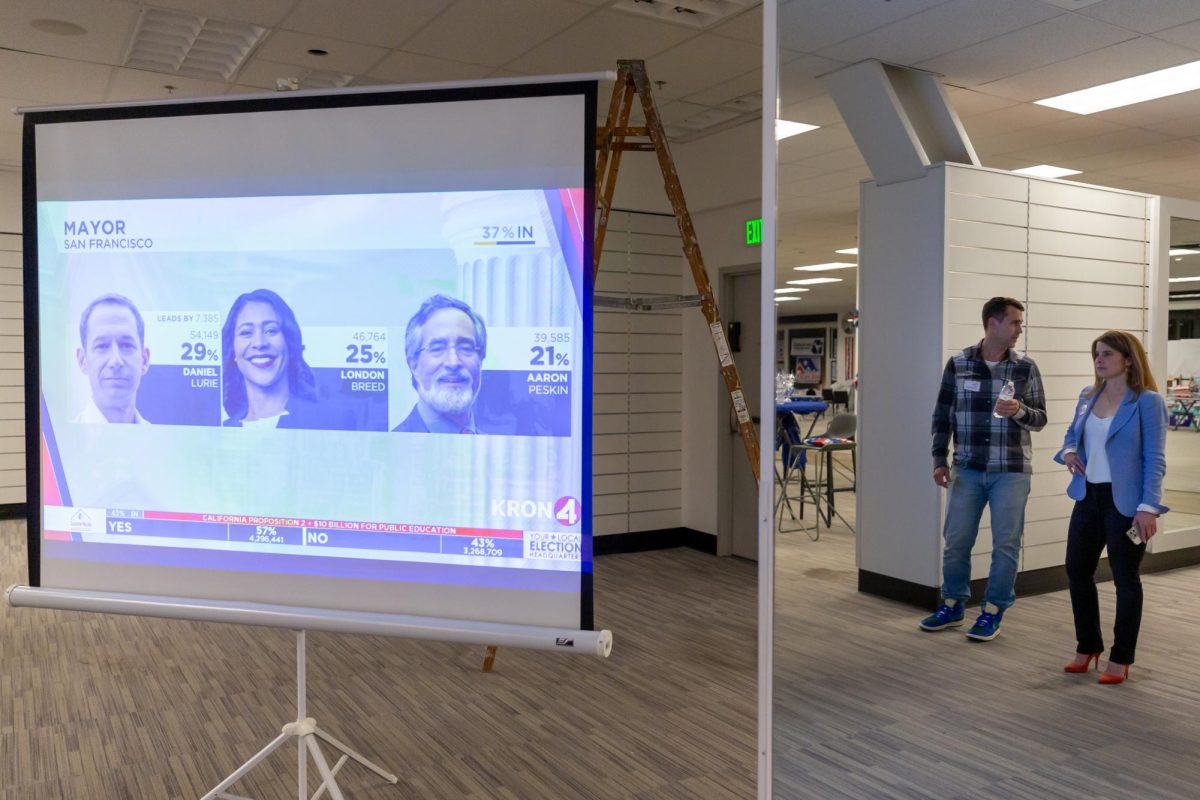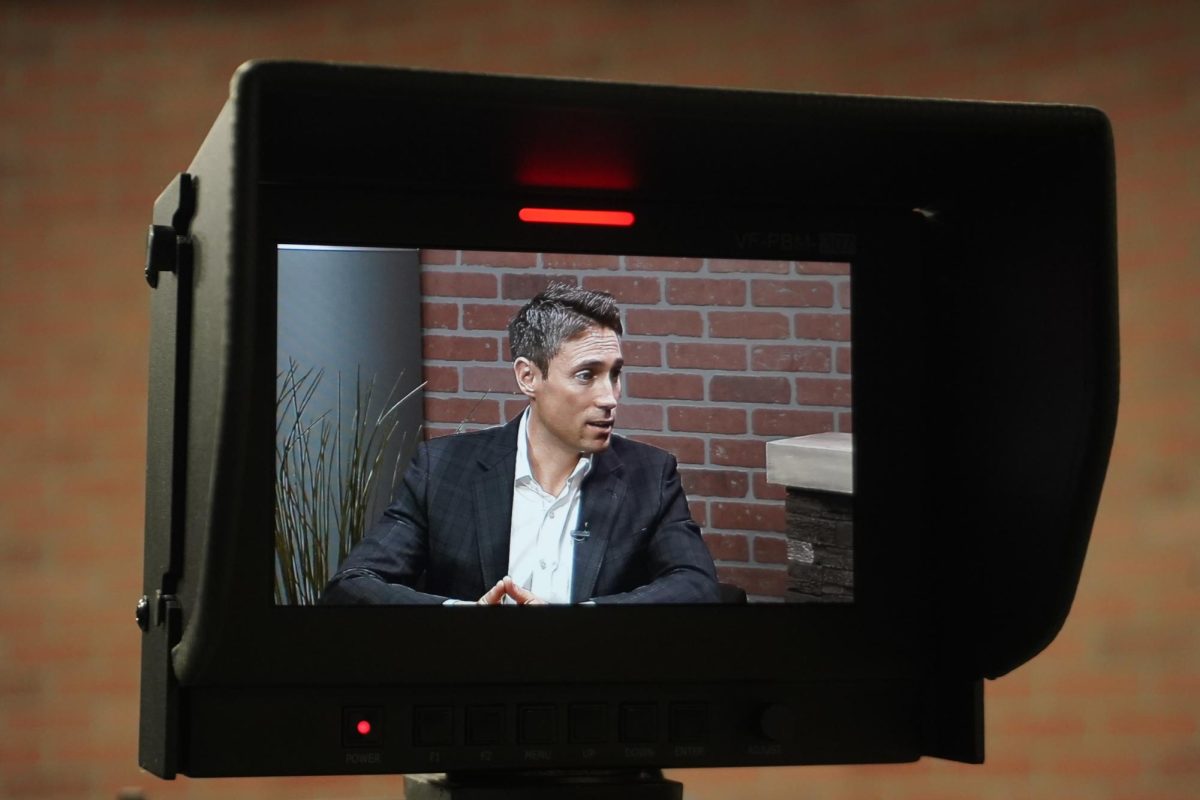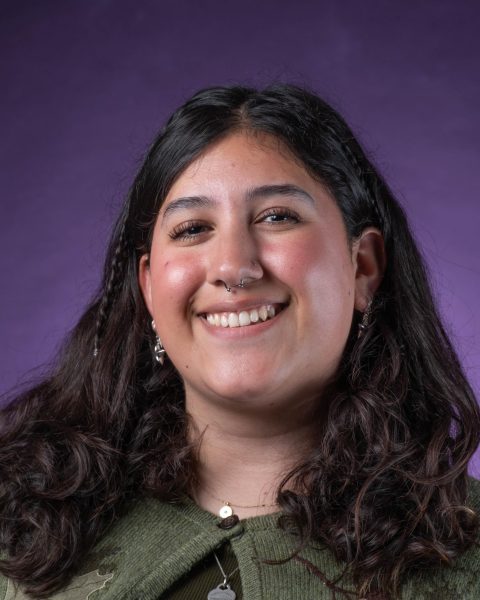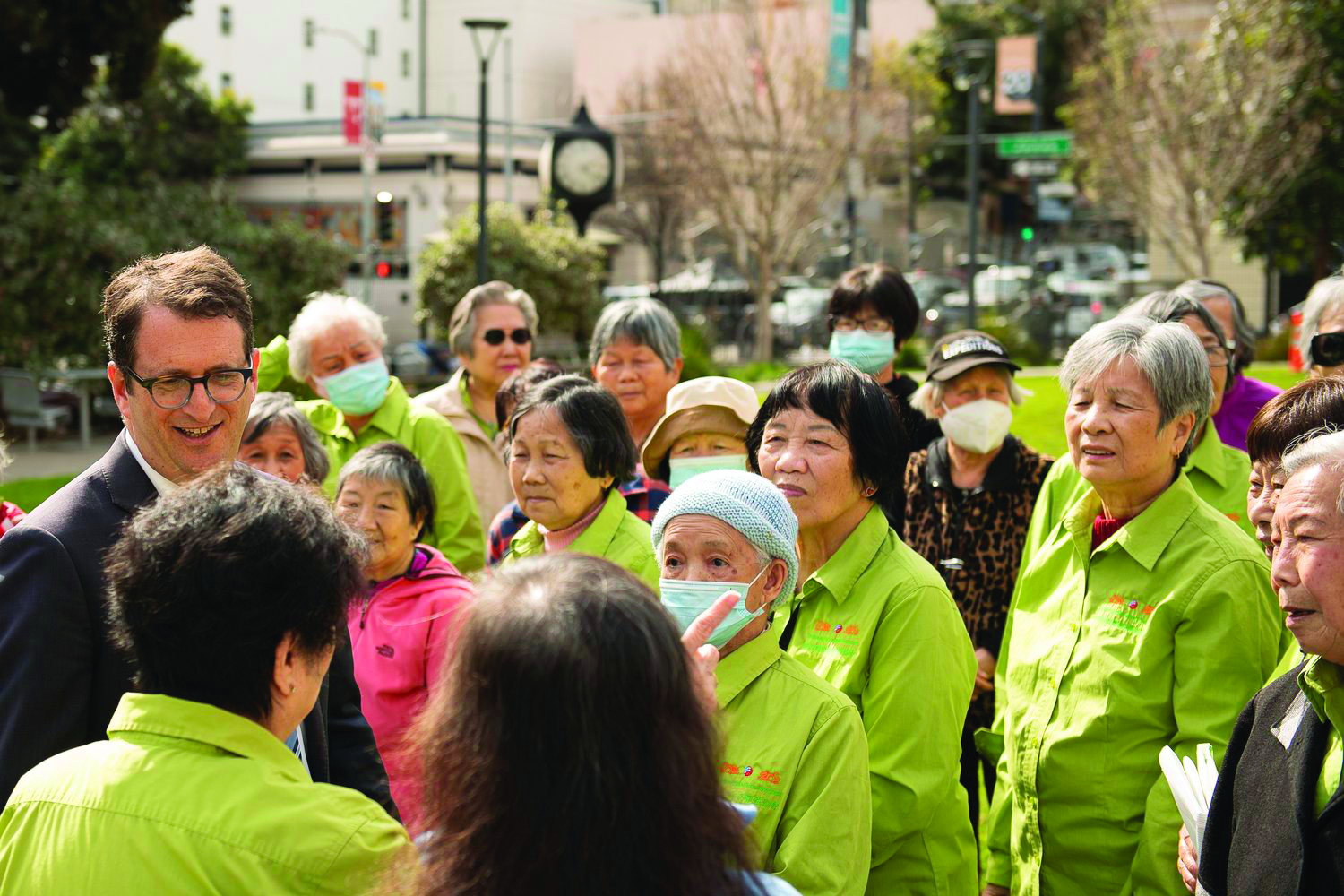
Editor’s Note: The reporter on this story was a fellow in Dean Preston’s office through PLSI 669 and has participated in his campaign.
Amidst a contentious District 5 election, incumbent Supervisor Dean Preston’s position is up for re-election. Preston is known for progressive policies and for being the only self-identified democratic socialist on the San Francisco Board of Supervisors.
Former staff reporter and current campus editor, Cami Dominguez, and former breaking news editor and current Editor-in-Chief, Gabriela Calvillo Alvarez, sat down with Preston back in May 2024 to discuss youth involvement in politics.
The 2023-2024 academic year was full of student organizing — from faculty picket lines, tuition increase rallies and Pro-Palestinian encampments, San Francisco State University is an organizing hub, making national headlines on various occasions.
In this podcast, Preston speaks about his experiences as a socialist in office and his early start in student activism when he attended Bowdoin College. Additionally, he touches on the relations to the current surge of student organizing happening in academic institutions all over the U.S.
Intro
Gaby: 0:00 – 0:07
My name is Gabriela Calvillo Alvarez. I am the current breaking news editor and the incoming editor-in-chief of Golden Gate Xpress and I am here with…
Cami: 0:08 – 0:12
Cami Dominguez, I am a staff reporter for Golden Gate Xpress.
Gaby: 0:13 – 0:20
We’re right at the front of City Hall and we’re about to go interview Dean Preston. Cami, can you tell me who that is?
Cami: 0:21 – 0:47
It is District 5 Supervisor Dean Preston. He overlooks neighborhoods like the Fillmore, the Tenderloin, Haight Ashbury and a few other more? I think we can clarify that when it comes into the podcast, maybe Dean can talk about that a little bit more. But yeah, I wanted to set up this podcast with Dean because both Gaby and I have somewhat of an involvement with political science. You are a double major, correct?
Gaby: 0:48 – 0:49
Yes, I am.
Cami: 0:50 – 0:57
Love that. I’m a political science minor. To fulfill some credits for my poli sci minor, I actually pursued a fellowship in his [Dean Preston’s] office where I’m currently a fellow.
Gaby: 0:58 – 1:10
We’re just waiting right at the entrance. It’s huge. There’s so many people. It was a long, hard-fought battle to be standing at the steps of City Hall getting ready to interview Dean Preston. Are you ready to go?
Cami: 1:11 – 1:14
I am ready to go, OMG.
Interview
Cami: 1:15 – 1:18
Good afternoon supervisor Dean Preston. Welcome to the podcast.
Dean: 1:19 – 1:20
Thank you. Good afternoon.
Cami: 1:21 – 1:29
So thank you for joining us today. I feel like I’ve been working at the office for four months and I feel like I haven’t really gotten the chance to sit down and talk to you.
Dean: 1:30 – 1:32
Yeah, it takes a podcast for us to sit down, so here we are.
Cami: 1:33 – 1:39
Dean is a very busy guy. Gaby, do you want to go into a bit of the details as to why we brought Dean here?
Gaby: 1:40 – 1:52
Yeah, I mean, we just wanted to talk to you about like, I’m sure you know about all of the student organizing that’s been going on. Cami has been telling me a little bit about the work that you do. And I don’t know if you want to lead into that?
Cami: 1:53 – 2:24
Yeah! So I think if anything, I just wanted to sit down and talk to you as a politician because —I don’t know if you’re like aware but the past primary election cycle generally the voter turnout just wasn’t good and in California, there was only 7% of youth that turned out to vote. I just wanted to sit down and talk to one of the most talked about supervisors in San Francisco about your thoughts regarding youth involvement in politics.
2:25 – 2:44
You’re currently the only member in the Board of Supervisors right now, who identifies as a democratic socialist, so specifically your connection with the Democratic Socialists of America (DSA). Tell me, have you always identified as a democratic socialist? Like was this something that connected to your upbringing? Like, what radicalized you?
Dean: 2:45 – 3:23
All right, well, yes! So, yeah, I’m the only democratic socialist on the Board of Supervisors and was actually the first democratic socialist elected in San Francisco for 40 years. It was kind of interesting running, very clearly, as a member of the DSA chapter here and democratic socialist, and I think there were a lot of otherwise progressive folks who really wondered whether that would spell defeat in an election. So that was kind of interesting.
3:24 – 4:34
I think we disproved the folks — the critics who were kind of like, “Hey, you shouldn’t be out there so vocally as Democratic Socialist.” So that was interesting. You know, ran in 2019, 2020 and definitely was very clear about being Democratic Socialist and talking about what that means. I think there was certainly like an appetite among voters to actually have someone in office who’s a democratic socialist. But I will say it felt at times a bit generational, right? Like a lot more concerns from older progressives who are probably socialist but don’t necessarily publicly identify as such — raised in an era of more of a stigma on socialism where younger generation voters seem to more quickly get it and actually be motivated to turn out, to volunteer, to donate, to get involved because we were so explicitly running a socialist campaign.
Cami: 4:35 – 5:12
Just pivoting a little bit more back into your career, specifically in college… there’s currently a surge of student organizing going on mainly college campuses all across the country. It’s something that we’ve seen happen at SF State a lot within just the past year, like with students supporting our faculty going on the picket line last semester or the current encampments for Palestine — was student organizing something that you were ever interested in when you were still in your academic career? Did you ever participate in it? What issues were you passionate about when you were a student and a young voter?
Dean: 5:13 – 6:06
Alright, well, you’re going way back in history cause I’m old, but yes, the answer is yes! I got involved in protest and activism in college and was part of the first major rally in my campuses back in ‘91 — I graduated in 1991 so this is way back. But at that time, we engaged in the first protests on campus that actually shut down the administration building, it was the first time since the Vietnam War that that had happened on campus. Our protests at that time were actually about issues around inclusion and diversity on campus and there was quite a bit of controversy on campus around that in no small part because the administration building at the college I went to included also the library.
6:07 – 7:09
So all the folks who were looking for reasons to critique our protest, because there’s always a reason people don’t want you to protest the way you’re protesting, right? So in ours, it was “Well, I support this,” but “Oh, they’re shutting down the administration building and a library. You can’t shut down a library,” so it’s always inconvenient. Good protest, right? It’s like when people shut down the bridge and so forth. There’s never a shortage of people who will tell you why your form of protest is not the right one — I think it’s pretty misplaced. But anyway, just personally, I got involved and probably radicalized to some extent through that. I don’t think I was early as a student or in grad school or early in my profession, I don’t even think I asked myself the question of whether I was capitalist, socialist. It wasn’t really part of my self definition one way or the other.
7:10 – 8:07
Looking back on it, I believed firmly in things like housing as a human right and healthcare for all, and so forth. So I was fighting for socialist causes but without really that definition. Before I took office for 20 years, I was doing housing work and and tenant rights work. I think I probably started out with a little more hope, maybe naively, that some of these systems could be reformed, and it did take me years of advocacy to fully understand how entrenched the interests are and how, even though there were certainly logical reforms that could make things better, that there is a power dynamic and reason that those reforms don’t happen and won’t happen.
Gaby: 8:08 – 8:48
I think you bring up a really interesting point that I’ve heard my entire life, that as you get older, you get more conservative and you know, like even more now, I see people trying to say that activism has no role in politics or trying to separate the two. And something that I feel that has been pushed on a lot of people with joining organizations like DSA or like other people to start locally organizing. It’s because they have a general distrust of the government and I feel like this is something that has been existing in the U.S. for a few years. Cami, I don’t know if you want to build off on that.
Cami: 8:49 – 9:32
I think this upcoming November election — I’m so fascinated to see how it’s going to play out, especially on the youth side of it, because this distrust has translated on to youth. That’s why we see a lot of people lean more like candidates who are democratic socialists. Gaby, I don’t know if you can attest to this, but I’m seeing a lot of my own friends saying that they’re either not going to vote in this upcoming presidential election or they’re going to vote undecided. I wonder if this is something that will end up affecting youth voter turnout even more but I’m curious to hear what you think, Dean. As a politician, what do you say to young voters who might not see the importance of participating in local and national elections?
Dean: 9:33 – 10:25
Yeah, I get where they’re coming from. I do point to the stuff that we do and are able to do that makes a huge difference and it’s because of who we elect. Balancing those, I do get why folks would watch a lot of the political discourse and listen to it and just feel like it’s completely out of touch with the reality that folks are facing and accommodates right-wing interests, right-wing media, big corporate interest to such an extent that it can be really deflating. But at the same time we’re seeing, especially in cities — we’re seeing the growth of some pretty amazing movements and big accomplishments.
10:26 – 11:38
We funded the rent relief through the tax that I wrote and that DSA championed on Prop I in 2020, that’s raised over $300 million. I mean that’s where the money for rent relief — for a bunch of social housing we acquired, came from. That’s the power of having folks in office. So I would encourage folks to just like themselves, get involved, run [for office]. I think we need a whole new slate of people who are activists, who are running for office and who aren’t in office to just figure out their next office and then retire as lobbyists. There’s a very just kind of cynical and sad-like path that people are in in politics. But it makes a massive difference, I think. Whether you have a majority or not even just having a voice in the room. When you elect a Cori Bush or some of these amazing local leaders — some of the folks elected in Chicago — it does have a very big impact and it has an impact in tangible results that you win, but also just in these conversations.
11:39 – 12:25
I often feel like half my role, some of it’s getting things done and some of it is also just to at least hold the line on some things. So when the police come through with their next $100 million that they’re asking for God knows what, at least there’s someone who’s willing to say, “This is not OK and here’s what you’re not funding, so you can give police another $100 million.” I wouldn’t have thought before I was in office that that would have been my role. I felt like there used to be more people who would speak up on these things, and I’m increasingly feeling like it’s the folks who are activists first and then politicians second — like they get into office through their activism, who hold the line in a way.
12:26 – 13:01
My colleague like Carroll Fife in the East Bay, who I organized with when she was at ACCE (Alliance of Californians for Community Empowerment) and there’s no worry that there’s going to be some debate and Carroll is going to be thinking of how she’s going to retire as a lobbyist in 15 years. That’s not guiding her decisions, you know? She’s an activist first and foremost. I assume she’d say the same thing. That’s certainly true for me and I think true for I think all the DSA folks who would identify that way.
Gaby: 13:02 – 13:44
So, you kind of essentially answered our last question about like youth involvement and why it’s so important in politics. And I guess I want to ask — what would you say to a student right now seeing all of these encampments, protests, organizing happening at their own schools and their own universities — maybe being persuaded in a way, or convinced that it’s not as important as it actually is. How would you tell that to a student at SFSU who may be feeling that way or other students at other schools around the country?
Dean: 13:45 – 14:25
I think that the way folks are trying to make students feel in terms of questioning tactics, in terms of “Does this really make any difference?,” it’s the same kind of approach that activists who organize around anything in history get. That same argument for when people were protesting whether it’s the Vietnam War or apartheid in South Africa, you will always be confronted with folks who say that the particular thing you’re doing in this moment is not going to change that or it’s not worth doing.
14:26 – 15:07
They said the same thing when I authored the ceasefire resolution. “Well, do you think that the Israeli Government is sitting there looking at what San Francisco’s Board of Supervisors does? Why are you wasting time on this?” The same kind of reaction. In fact, I’m hard-pressed to think of any moment of protest that I’ve been involved in. Whether it was Black Lives Matter protests after the murder of George Floyd or housing protests locally against evictions. I mean, you name it — there are always going to be people who will say “That protest isn’t going to make a difference.” But ultimately, it’s the only thing that makes a difference.
15:08 – 15:55
I don’t think anyone engaged in protest is under some illusion that their act alone, individually or collectively, is like the sole thing. They’re part of a movement. I think it’s very belittling when you have people who tell [other] people that their activism isn’t worth it because their activism alone isn’t going to change everything. I mean, that’s how we’re in the climate change nightmare we’re in because everyone gets convinced that their personal activity or what their city does, or their form of protest like doesn’t matter or is insignificant in this broader scheme of things. But we’ve seen over and over again, we’ve seen policy change when you have mass movements.
15:56 – 17:05
Those mass movements don’t just come out of thin air. They come from one campus, then two, then five, then 50. Engaging in struggle. I think particularly young people know what’s right and what isn’t right. You don’t have to solve everything with your act of protest, and anyone who puts that burden on you and says there has to be this straight line between your act of protest and everything changing, they’re just trying to demoralize you. The reality is what changes things is mass movements and that’s what’s happening, right? So I would just urge people to stay strong and also to recognize and to be radicalized by the things that people see that are trying to silence you. Because that’s ultimately not the first time that university administrations or police departments or others have tried to silence people who are dissenting and fighting for human rights and it won’t be the last time.
17:06 – 17:45
But looking at where are those levers of power? Who is failing students and young people in this society? And how do students and young people in the society take those reins of power? So media, for example, the media is absolutely failing and how they’re covering this so I don’t think that’s just about convincing journalists to be better. I think it’s about the folks who are engaged in protest becoming journalists and doing, not just like the podcast you’re doing, but expanding into and trying to find paths to make this their work or going into politics. If it’s the political decision-makers who are failing, take their place.
17:46 – 18:31
That would be my message to folks — I hope that out of — and I’ve seen over and over again that like out of really bad situations is where generations of leaders come from. I’ve worked [with] all of the state of California with folks organizing for tenant rights and housing justice, like the strongest leaders by far are the people who were evicted. It traumatized and shattered their family’s sense of security, their ability to survive and they turned that into heading up new tenants’ unions and law. That powerful story converting that into and having that fuel activism.
18:32 – 19:03
In addition to actually changing U.S. policy on Israel and bringing an end to this humanitarian crisis, my hope and expectation is just given this overreach in trying to punish anyone who stands up for human rights, that folks will emerge from that who dedicate their lives to continuing the struggle they’ve been engaged with on campus.
Cami: 19:04 – 19:07
Can I ask you a very silly question that I feel like our readers would enjoy?
Dean: 19:07
Sure!
Cami: 19:08 – 19:10
What is your astrological sign?
Dean: 19:11 – 19:12
Oh my God, I’m a Scorpio.
Gaby: 19:13 – 19:15
You’re a Scorpio? So is Victor [Harris Jr.] (former podcast editor).
Dean: 19:16 – 19:21
People either say “Really you’re a Scorpio?” or they’re like “Oh, that explains everything.”
Gaby: 19:22 – 19:23
You don’t seem like a Scorpio.
Dean: 19:24 – 19:26
See, I get either that or people who say “That explains it.”
Gaby: 19:27 – 19:32
You don’t mind sharing your birth time, your birthplace, just so we can figure the rest out.
Dean: 19:33 – 19:35
New York City. That’s right.
Gaby: 19:35
Oh, you’re from New York.
Dean: 19:36
Yep, Yep.
Cami: 19:37 – 19:53
Well, thank you so much for taking the time to talk to us, Dean. I know you’re a really busy guy but I think that this type of dialogue between students and politicians is very crucial in this day and age. So genuinely thank you so much for taking the time to sit down and chat with us.
Dean: 19:54 – 19:55
Yeah, my pleasure. Thanks.
Outro
Gaby: 19:56 – 20:07
We’re in the cafeteria now, in the basement of City Hall, and we just ate hella. How are you feeling Cami after our interview with Dean?
Cami: 20:08 – 20:40
I am feeling very good. I think that we were able to touch a lot of the bases that we wanted to touch. I think within the last two questions his answers were so, oh my God. I am very — I’m very excited for this to be released. I think it would be interesting to see those perspectives of what politicians think of youth, like the role of youth in politics is cause Dean’s answers were very much like “the role of the activist.”
20:41 – 21:06
I really think that it was pretty interesting to hear him saying “I think activists are the people that should become politicians or the people that should become journalists, like we need this type of change in the system,” and obviously that is coming from a democratic socialist. I wonder what other supervisors would say to that, you know? I don’t know if other supervisors would be as inclined to say that activists have a role in politics.
Gaby: 21:07 – 21:09
Especially the youth.
Cami: 21:10 – 21:11
The youngins.
Cami: 21:12 – 21:18
This has been Cami Dominguez with Golden Gate Xpress. I’m signing off. Gaby?
Gaby: 21:19 – 21:23
This has been Gaby with Golden Gate Xpress and I’m signing off.
Cami: 21:24 – 21:26
Yay!





